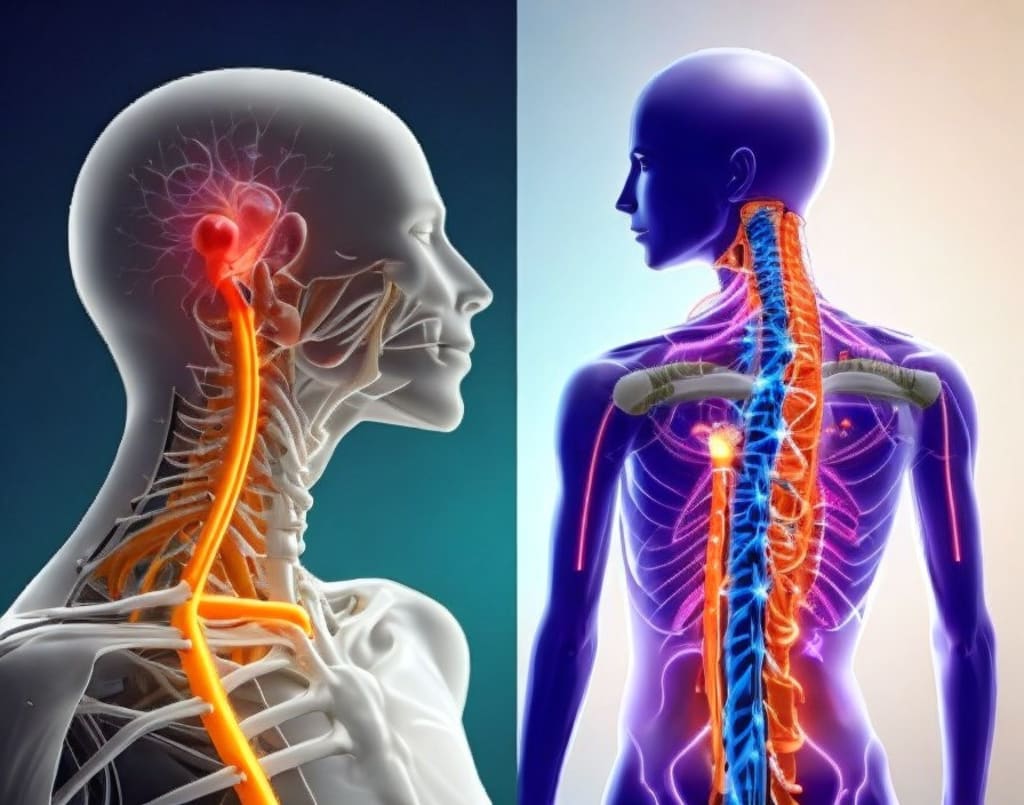The Vagus Nerve: Your Body's Master Communicator and the Key to Unlocking Better Health
Unveiling the Secrets of the Wandering Nerve and Its Potential to Revolutionize Chronic Disease Treatment

The Vagus Nerve: Your Body's Master Communicator and the Key to Unlocking Better Health
In the intricate network of nerves that govern our bodies, one stands out for its remarkable versatility and far-reaching influence: the vagus nerve. Often referred to as the body's "wandering nerve" due to its extensive journey from the brainstem to the depths of our abdomen, the vagus nerve has become a hotbed of research, holding immense promise for treating a variety of chronic health issues.
A Journey Through Time: Unveiling the Vagus Nerve
The vagus nerve's story stretches back centuries. As early as the second century AD, Greek physician and philosopher Galen identified it as one of the twelve cranial nerves, those originating directly from the brain. Since then, scientists have diligently unraveled the intricacies of this nerve's role in health and disease.
Living Up to Its Name: The Vagus Nerve's Extensive Network
True to its "wandering" moniker, the vagus nerve embarks on a remarkable journey, branching out from the brainstem and descending towards the chest and abdomen. Like a meticulously planned telephone system, it innervates (supplies nerves to) vital organs like the heart, lungs, gut, spleen, pancreas, and liver. This extensive network positions the vagus nerve as a critical communication hub between the brain and the body's core functions.
The Vagus Nerve: A Two-Way Street for Optimal Health
Imagine the vagus nerve as a sophisticated communication channel. It facilitates a seamless exchange of information between the brain and the body. Equipped with sensory and motor neurons, it acts as a two-way street:
Sensory Input (Informing the Brain): Roughly 80% of the vagus nerve is made up of sensory neurons. These act like tiny detectors, constantly sensing signals from the body, be it the mechanical stretch of a full stomach, chemical changes in the gut, or even fluctuations in temperature. This vital information is then relayed to the brain for processing.
For instance, when the stomach stretches after a meal, vagal sensory neurons transmit this information to the brain, regulating our appetite and signaling us to stop eating.
Motor Output (Directing the Body): The remaining 20% of the vagus nerve consists of motor neurons. These function as the brain's messengers, carrying commands that influence various bodily functions. Notably, vagal motor neurons play a crucial role in regulating heart rate. When activated, they send signals to slow down our heart rate, which is essential during exercise or a potential heart attack.
The Vagus Nerve and Chronic Disease: A Complex Interplay
While the vagus nerve plays a vital role in maintaining optimal health, its involvement in chronic diseases presents a fascinating puzzle. Many diseases seem to disrupt vagus nerve activity:
Obesity: Research suggests that in obesity, the vagal sensory neurons become less sensitive to meal-related signals, potentially leading to overeating.
Cardiovascular Disease: Vagal motor neurons may become underactive in cardiovascular disease, hindering the body's ability to regulate heart rate effectively.
However, the question of cause and effect remains. Do these diseases directly impact vagus nerve function, or is it the other way around? Can a sluggish vagus nerve contribute to the development of such diseases? Scientists are actively investigating this intricate relationship.
Unlocking the Vagus Nerve's Potential for Better Health
The future of healthcare holds immense promise with the vagus nerve at the forefront. Its unique ability to bridge the gap between the brain and the body suggests exciting possibilities for treating chronic conditions. Researchers are actively exploring ways to stimulate the vagus nerve to promote better health. Some promising avenues include:
Vagus Nerve Stimulation (VNS): This minimally invasive approach involves electrically stimulating the vagus nerve. Studies are ongoing to assess its effectiveness in treating conditions like epilepsy and depression.
Lifestyle Modifications: Practices like deep breathing, meditation, and yoga may indirectly activate the vagus nerve, promoting relaxation and potentially improving overall health.
Conclusion: The Vagus Nerve - A Beacon of Hope for the Future
The vagus nerve, with its intricate connections and powerful influence on our health, presents a captivating avenue for future medical advancements. As research delves deeper, the potential for harnessing the power of this "wandering nerve" to treat and manage chronic diseases becomes increasingly exciting. By unlocking the secrets of the vagus nerve, we may pave the way for a healthier future for all.
About the Creator
suren arju
Hi there! I'm Suren, your startup guide. Entrepreneur, writer, dreamer - I share insights, tips & stories to fuel your startup journey. Ready to explore, learn & win together? Join me & let's redefine how we launch, learn & leap!
Enjoyed the story? Support the Creator.
Subscribe for free to receive all their stories in your feed. You could also pledge your support or give them a one-off tip, letting them know you appreciate their work.





Comments
There are no comments for this story
Be the first to respond and start the conversation.